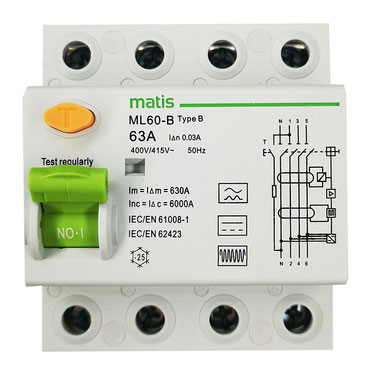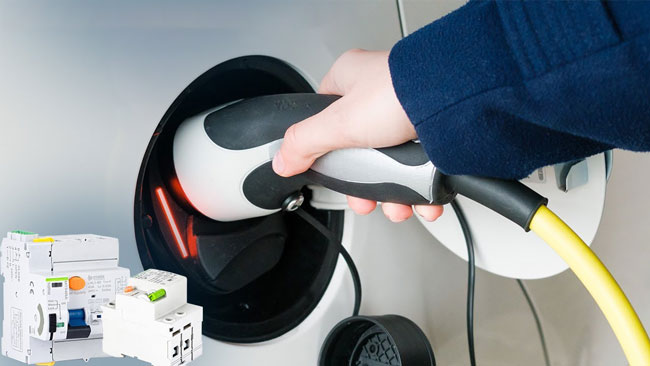Importance of Type B RCCBs in Electric Vehicle Charging
2023/06/14 丨Technical
Electric vehicles (EVs) are growing in popularity as people seek to reduce their carbon footprint and save on fuel costs. So does the need for public and home charging infrastructure. It is also necessary to consider the reliability and safety of equipment to prevent electric shock. One of the most important safety devices for EV charging is the residual current circuit breaker or RCCB.
What is a Type B RCCB?
RCCB is a residual current circuit breaker designed to detect leakage current and cut off power immediately to prevent electric shock. Type B RCCBs are more suitable for EV charging because they can detect both AC and DC leakage currents. Type B RCCBs work by monitoring the current flowing through the circuit and comparing it with the current returning through the neutral conductor. Electric vehicles use a high-voltage DC power supply, so a B-type RCCB capable of detecting DC leakage current should be used in the charging circuit to ensure safety.
Why Type B RCCBs Are Essential for EV Charging
Simultaneous Detection of AC and DC
Type B RCCBs can detect AC and DC leakage currents. Since EV charging uses a high-voltage DC power supply, a Type B RCCB can detect any DC leakage current and cut off the power supply to prevent electric shock.
Ensure Compliance
Many regions and countries have specific standards and regulations governing the installation and operation of EV charging equipment. Type B RCCBs are generally required to ensure the safety and reliability of charging facilities. This standard requires highly sensitive residual current protection for electric vehicle charging.
Improve Security
Type B RCCBs are very sensitive and can detect even small leakage currents in the milliampere range. By quickly disconnecting power in the event of a failure, Type B RCCBs help prevent electric shock, fire, and equipment damage, enhancing a safer and more reliable EV charging experience and personnel protection.
Compatibility with Modern Charging Technology
In addition to the safety advantages, another important consideration is the increasing use of renewable energy sources such as solar and wind power to charge electric vehicles. This allows EVs to not only draw power from the grid but also return power for various applications such as demand response and energy storage. These sources generate DC residual currents which can be detected and protected by Type B RCCBs.
Matismart Type B RCCB
Matismart Type B RCCBs are designed according to the standards IEC/EN61008-1 + IEC/EN62423. ML60-B RCCB type B can detect high-frequency AC and smooth DC ground residual current. It is also named "Universal Current Sensitive RCCB", which means it can be used in the widest range of applications such as variable speed drives, PV systems, and EV charging stations, and has always been designed for use in harsh environments. If you want to know more about this ML60-B Type B RCCB, you can watch the ML60-B Youtube video to know more about the functions and application scenarios or contact us for more information.
Conclusion
To sum up, Type B RCCB is a critical device to improve the safety and reliability of EV charging. They can prevent electrical hazards and ensure the safe operation of charging infrastructure by detecting and preventing various electrical faults. By picking a Type B RCCB for your EV charging unit, you can enhance safety and result in a more efficient charging experience.
- Solutions
- Products & Support
- Cases
- About us
- Contact
TEL:+86 18621879631
Email:timmy@matismart.com
Mobile phone:+86 15801814653
Address:Room 320, No.83, Huanhu West Road 3, Pudong, Shanghai, China, 201306
Wechat:+86-15801814653
Skype:timmybao2008
 沪ICP备09024882号-1
沪ICP备09024882号-1




 CN
CN





 Home
Home


